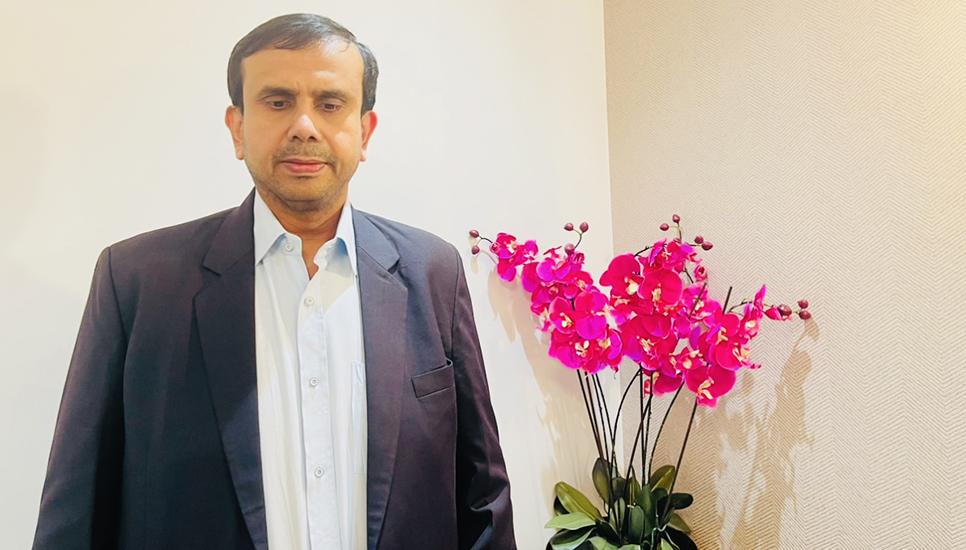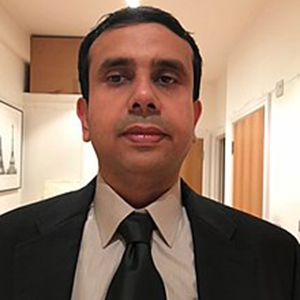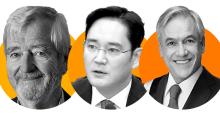Ashish Goyal: ‘From the dumpster to the goldmine!’

At one point in his life, Ashish Goyal believed he had nothing to offer the world.
Born and raised in Mumbai, India, he was diagnosed with retinitis pigmentosa, which caused his vision to deteriorate from the age of seven. By the age of 19, he was entirely blind and felt adrift from his childhood dreams of becoming a tennis player, and uncertain of his future potential “after more than a decade of isolation, bullying and self-doubt”.
However, when he felt ready to give up on life, he says “my parents introduced me to my spiritual mentor Padmashri Shree Guru Dr. Balaji Tambe. He changed my life when he said, ‘Ashish, you've lost one out of your five senses, so your glass is 80% full, not 20% empty.’”
Emboldened to explore new possibilities and opportunities, Ashish focused his energies on academics, graduating second in his class at Narsee Monjee Institute of Management Studies in Mumbai and also winning the 2003 Dun and Bradstreet Best Student Award.
He also owns dual distinctions of being the world’s first visually impaired graduate of the Wharton Business School (where he received the Joseph P. Wharton Award, given to individuals who best represents the Wharton Way of Life) and also the first-ever visually impaired investor-trader on Wall Street.
Now based in London and hugely respected as an investment professional focusing on global macro strategies (having managed portfolios for marquee hedge funds and institutions such as Citadel, BlueCrest and JP Morgan), he has also been honoured with India’s highest civilian award for a disabled individual – the National Award for the empowerment of persons with disability – by the President of India, and recognised as a Young Global Leader by the World Economic Forum.
An ardent advocate for socio-economic equality and inclusion, Ashish serves on the board of The Inclusion Initiative at the London School of Economics and the Rising Flame in India. In the past, he has served on the board of the Peek Vision Foundation in the UK, has passionately supported theatre and the arts, and has represented the winning team in the UK domestic blind cricket tournament at the London Metro Club.
Ashish continues to embody an overflowing spirit of a holistic and balanced life by working alongside the Akshaya Patra Foundation, a global not-for-profit organisation headquartered in Bengaluru, providing food and educational resources to in-need children.
Here, Ashish Goyal shares his story, his passion for macroeconomics and his wish to help families flourish in the future…

How did you get to where you are today?
It still feels like a dream that I'm actually investing in global financial markets and living in London. Growing up in the 1990s in India and having no vision, I felt that my options were severely limited until I was introduced to accounting and economics, which is when I fell in love with macroeconomics. However, the fact I was 19 years old and almost completely blind meant I was ready to give up before I even started.
So, my parents introduced me to my spiritual mentor who changed my life. He told me that my brain had got stuck in a loop of analysing all different possible futures that were hindered by a lack of vision… ‘Now, let's start training it to learn to solve that problem,’ he said.
The next day I woke up with this little ray of hope and I started on the road to my second life. I started to learn how to live as a blind person, with all the difficulties that comes with that, and I started to learn how to dream again.
As a result, I decided to do my MBA in India and I got through to a decent college in Bombay. There, I realised I loved numbers – and, importantly, I could do them in my head.
As I delved further into macroeconomics, I became fascinated by markets and was lucky to meet Dr. V Raghunathan, the ex-President of ING Vysya Bank, who said, ‘I don't care if you're blind if you can do the work for my bank’. As it turned out, I came top of the class in the interviews and he liked me so much he gave me my dream job. For me, it was like going from the dumpster to the goldmine!
After a couple of years in India, I realised there was no scope for me to gain further trading experience, so I took the advice of a friend and looked at the possibility of working on Wall Street.
To get there, I enrolled and became the first blind student to attend The Wharton School of the University of Pennsylvania. Following that, after tremendous effort and lots of luck JP Morgan gave me an internship in London and ten months later, I found myself in the office of CEO Jamie Dimon’s number two Bill Winters. I said to him, ‘It seems like your bank likes me, but they don't have a job for me.’ He asked me to leave it with him and after a batch of interviews with very senior members of the various asset classes and management, they all decided to take a chance on me and gave me a job on the prop trading desk and I became the first blind person to trade on Wall Street. I will always be grateful to Bill Winters and JP Morgan.
From there, I realised that my only way forward to be in financial markets on the buy side was with hedge funds. And that's how I find myself after more than 15 years, having worked for five amazing organisations and having navigated the financial markets.
You have to give back in a way that that makes impact.
You’re also a passionate supporter of education, disabilities, human rights, sports, environment and the Vedic Sciences. Where does this drive to give back come from would you say?
I wouldn't be here without the advice of my mentors and my family. Because of them, I realised that we all have the ability to change someone's life in a very positive way.
I'm a big believer in the Indian Vedic philosophy and every action I take, I think about how it impacts my family, community and nations – both India and the UK, where I now live and the world.
You have to give back in a way that that makes impact – and a lot of us can have phenomenal impact with very little effort and we all should use our abilities to make a positive contribution.
As an investment professional, why focus predominately on global macro strategies?
I felt a strong connection learning about how a country can do good for its people. What is the best way to manage a country? What does the country's balance sheet mean? How can you have productive and non-productive spending? How does inflation work? What can central banks do?...
That, to me, was the most dynamic and fascinating thing. This is what I love. It’s like solving a puzzle.
Governments and central banks around the world have the ability to make or break their countries. Private players can have a $3 trillion company, but if your country and its politicians and central banks go haywire, none of that matters. If you look at the story of Singapore, 60 years ago they got their first Prime Minister, Lee Kuan Yew, who led a small population to phenomenal success as a world-leading financial hub. Similarly, India over the past ten years has changed everything in the right direction, macro for me is something that affects nations and I love analysing and investing in it.
The great thing about family offices is that they can take longer term views.
Campden Wealth’s European Family Office Report 2023 found that European family offices have, in the main, survived and thrived following the global economic events of the past few years. While a third of family offices reported a reduction in AUM, 53% reported an increase, with 16% reporting an increase of more than 10%. When asked how their investment portfolio performed relative to benchmark, 40% of respondents reported that it had outperformed. Looking ahead, what do you think families can to do flourish in the future?
The great thing about family offices is that they can take longer term views. With family offices, the earning ability is amazing. They can actually do meaningful allocation changes when they want to.
However, there are some points that they need to be careful about in the next few years. One is that the central bank and government intervention we've seen in the financial markets since the global financial crisis of 2008 has been absolutely astonishing. For example, the US Federal Reserve's balance sheet has gone from roughly a trillion dollars to eight trillion dollars. American debt to GDP has skyrocketed and this is a global story across various countries. These are not small numbers. That kind of excess money in the system has lifted all boats.
Another point is that everything that we've seen in the past 16 years is not really going to be the same for the next few years. So, to get better or stable returns for your portfolio, you need to start studying what has happened before 2008, because that's how markets will start trading. 14 out of the past 16 years, the world was synchronized, but for the last two years you've seen the US and China completely diverge, which is something that people my age and younger have never seen before.
The final point is that, while diversification is great, it’s not the mantra that gets you out of everything. A lot of times, you need to know when to diversify less or reallocate within that diversification. A lot of people think that diversification is the be all and end all. I think there are times to be completely diversified and times to be completely concentrated.
What are you personally hoping to achieve in 2024?
From 2008 to 2023, I was macro investing in G7 and emerging market Asia countries. So that means I've been investing in fixed income in currencies and equity indices at the index level.
It has been a lot of fun and fascinating, but I've stepped off and taken a break for the past few months. Now I’m trying to figure out how to take the skill set I’ve acquired over the years and help institutions, family offices or endowment and pension funds do what they need to navigate what are set to be upcoming choppier markets.
I'm looking to contribute with my experience of macro investing, my knowledge of geopolitics, my risk management skills and my understanding of various countries. I am looking for a new home to contribute with my skills and expertise.
It's all very straightforward, you need to do the best you can be…
You’ve also presented many times as a motivational speaker, including at the London Stock Exchange, the World Economic Forum in Davos and the Sohn Charity Conference. Can you talk about the value of sharing your story and why you are driven to share it?
About 19 years ago, after I graduated from business school and joined ING Bank, I was approached by a newspaper in India. They wanted to do a story about me and I said, ‘No’.
My father said, ‘Ashish, I think you made a mistake. When you share your story, you're not doing it to make yourself feel proud, you're doing it because it can help other people, your story of resilience, determination and hope through adversity is for you to share with others.’
So, I did the interview and afterward people reached out to me and said, ‘Thank you, I needed to hear what you had to say’.
That made me realise what an impact I could make and I decided to keep sharing my story.
It's all very straightforward, you need to do the best you can be… I have to be the best investor that I can be. My disability doesn't come into the picture when I'm in a business environment. I will still do everything ethically and in a principled fashion, but I don't give an inch because that's what you need to do to succeed. And on the other hand, it’s important to remain grounded, humble and true to oneself. And most importantly learn to switch off and relax.







